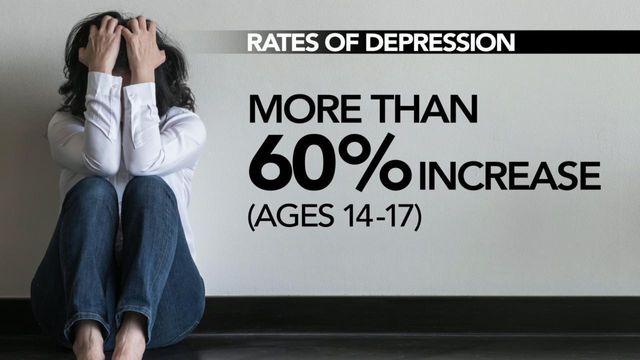How to talk to your kids about anxiety and stress
Here are some suggestions about how to talk to your kids about anxiety and stress.
Posted — UpdatedOf course, this is nothing new. Young people have always had to deal with the pressure to make good grades, get into college and succeed. But this generation appears to be suffering from a much greater level of stress.
According to the National Alliance on Mental Health, 20 percent of teens ages 13 to 18 have a mental health condition; 11 percent have a mood disorder and 8 percent of youth have an anxiety disorder.
Meanwhile, teen suicide rates are on the rise. For girls ages 15 to 19 alone, the suicide rate doubled from 2007 to 2015, according to the Centers for Disease Control and Prevention. The suicide rate for those age 10 to 24 has risen every year since 2008.
Teens WRAL News talked to mentioned social media, technology and school shootings as reasons for the increased stress levels.
Here are some tips they provided:
- Try to avoid asking vague questions or questions that can be answered with yes or no. "How was your day?" and "Did you have a good day?" won't lead to much discussion.
- It's important to ask open-ended questions like, "Tell me the most stressful part of your day." The idea is to focus on encouraging the process of sharing and connecting and not on the content of what is being communicated.
- Consider the time of day and your child's schedule. For most people, early afternoons are a terrible time to engage in cognitively challenging tasks. That's why it's important to ask specific questions that do not require as much energy right after school or at the dinner table.
Here are questions the therapists suggest you can ask:
- "What was the best thing that happened today? What was the worst thing that happened today?"
- "What's your favorite thing about social media? What do you hate most about social media?"
- "If you could go back in time and re-live one experience from today what would it be?" or "If you could go back in time and do one thing differently today what would it be?"
- "What do you think is causing these scary/bad/horrific things? How do you make sense of it?" The idea is to get the teen to start talking openly about the confusion and fear they might be experiencing and processing it externally rather than solely internally. This is not the time to tell them what you think is going on or to correct them, unless they directly ask you for your thoughts.
- "What do you think would happen if [the worst case/most feared scenario] happened?"
- "What's one thing you can do, maybe even today, that might make the problem less scary?" or "If you were a superhero (or the President for more mature adolescents) what would you do to fix this problem?" The idea here is to help foster an internal locus of control. Merely imagining that something positive can be done about the problem can help alleviate stress and worry.
- You can also try asking about other people in the child's life to get them talking. Sometimes teens don't want their parents prying into their own lives but would be more than happy to "gossip" and provide commentary on what's going on in other people's lives. This, of course, can be a slippery slope but it can be effective for teens whose MO is to shut down. For example, "Who's dating who at school?" or "What kind of music are your friends listening to?"
• Credits
Copyright 2024 by Capitol Broadcasting Company. All rights reserved. This material may not be published, broadcast, rewritten or redistributed.






